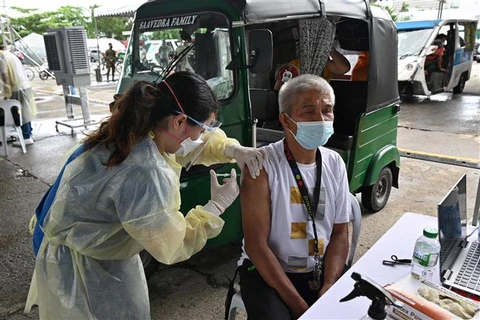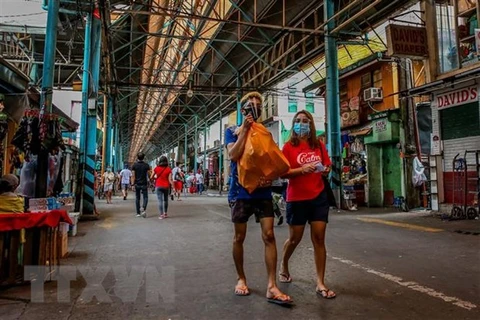 People waiting in line to get vaccinated against COVID-19 in Manila, the Philippines. (Photo: AFP/VNA)
People waiting in line to get vaccinated against COVID-19 in Manila, the Philippines. (Photo: AFP/VNA) Six months behind in rent and unable to afford cooking gas, the 77-year-old joined hundreds of others on August 11 at a covered basketball court to receive a thousand peso (20 USD) government handout, AFP reported.
About 80 percent of the more than 13 million people living in the metropolitan Manila area are eligible for the cash aid, in a government effort to ease economic hardships caused by the latest lockdown.
For Gomez, who normally only earns up to 200 pesos during the lockdown, the aid is a big help. He said that during lockdown, the tricycle drivers can only operates on Mondays. Burdened with a debt of 20,000 pesos in rent and at risk of being evicted from the small apartment, Gomez recently turned to selling air conditioners for extra income. If necessary, he would sell his tricycle to pay for the debt as it is the "last resort".
Restrictions introduced since the start of the pandemic have shattered the Philippine economy, cost millions of jobs and left many families hungry.
A resurgence in infections, partly fueled by the hyper-contagious Delta variant that has torn through neighbouring countries, has triggered lockdowns in the capital and other areas.
With only about 10 percent of the population having administrated two doses of COVID-19 vaccines and hospitals being overwhelmed, Philippine officials currently have few options to curb spread of the disease other than imposing a lockdown.
However, stricter regulations, including a night-time curfew as well as a ban on eating in restaurants and exercising outdoors, is estimated to cost the Southeast Asian economy around 3 billion USD per week./.
VNA























